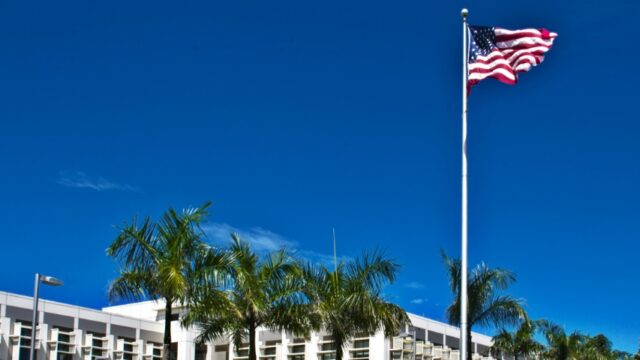
U.S. Embassy Suva, Fiji
The United States established diplomatic relations with Fiji in 1971, following its independence from the United Kingdom. Relations between Fiji and the United States have traditionally been good. The two countries share a multi-ethnic heritage, a commitment to democratic values, and a record of close cooperation on international peacekeeping operations, regional security, environmental issues including climate change, and economic development. The U.S. Peace Corps is active in Fiji, with some 65 volunteers in 13 Fijian provinces, and in 2018 celebrated its 50th anniversary in the country.
USAID funds regional projects assisting communities in accessing financing, building institutional capacity, and adapting to climate change. The Ready project (2016-2021) supports climate finance and management capacity. With the Pacific Community (SPC), the Institutional Strengthening in Pacific Island Countries to Adapt to Climate Change project (ISACC, 2015-2020) is undertaking climate finance assessments and supporting the scale-up of successful multi-sectoral projects. The Pacific American Climate Fund (PACAM, 2013-2019) builds the capacity of small local grantees while supporting their efforts to improve food security and natural resource management. As the largest contributor to the World Bank and, with Japan, to the Asian Development Bank, the United States supports a broad range of economic development and infrastructure programs in the Asia Pacific, including Fiji.
The United States has been among Fiji’s principal trading partners. The main products imported to the United States from Fiji include bottled water, tuna, and sugar. U.S. exports to Fiji are mainly machinery, transport equipment, and food. Fiji and the United States do not have a bilateral investment agreement. Tourism and remittances, including from the United States, contribute significantly to the Fijian economy. Fiji is a party to the U.S.-Pacific Islands Multilateral Tuna Fisheries Treaty, which provides access for U.S. fishing vessels in exchange for a license fee from the U.S. industry. Under a separate Economic Assistance Agreement associated with the Treaty, the U.S. government currently provides $21 million per year to Pacific Island Parties.
Today, the U.S. embassy is in Suva and also serves Kiribati, Nauru, Tuvalu, and Tonga.
Map Link:
Source:
United States Department of State, Office of the Historian and Bureau of East Asian and Pacific Affairs
Social Links:
https://www.facebook.com/usembassysuva